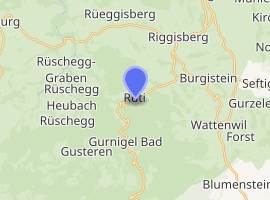Rüti bei Riggisberg
Rüti bei Riggisberg is a former municipality in the district of Seftigen in the canton of Bern in Switzerland.
Rüti bei Riggisberg | |
|---|---|
 Coat of arms | |
Location of Rüti bei Riggisberg 
| |
 Rüti bei Riggisberg  Rüti bei Riggisberg | |
| Coordinates: 46°47′N 7°27′E | |
| Country | Switzerland |
| Canton | Bern |
| District | Seftigen |
| Area | |
| • Total | 22.17 km2 (8.56 sq mi) |
| Elevation | 823 m (2,700 ft) |
| Population (2007) | |
| • Total | 411 |
| • Density | 19/km2 (48/sq mi) |
| Postal code | 3099 |
| SFOS number | 882 |
| Surrounded by | Blumenstein, Burgistein, Riggisberg, Rüeggisberg, Rüschegg, Wattenwil |
| Website | www SFSO statistics |
On January 1, 2009, the Rüti bei Riggisberg became part of the municipality of Riggisberg.[1]
Geography
Rüti bei Riggisberg has an area of 22.2 km2 (8.6 sq mi). Of this area, 32.1% is used for agricultural purposes, while 64.3% is forested. Of the rest of the land, 2.1% is settled (buildings or roads) and the remainder (1.5%) is non-productive (rivers, glaciers or mountains).[2]
Demographics
Rüti bei Riggisberg has a population of 411. As of 2007, 1.9% of the population was made up of foreign nationals. Over the last 10 years the population has decreased at a rate of -13.1%. Most of the population (as of 2000) speaks German (98.9%), with French being second most common ( 0.7%) and Portuguese being third ( 0.5%).
In the 2007 election the most popular party was the SVP which received 72.7% of the vote. The next three most popular parties were the FDP (8%), the FDP (8%) and the SPS (4.5%).
The age distribution of the population (as of 2000) is children and teenagers (0–19 years old) make up 31.8% of the population, while adults (20–64 years old) make up 51.6% and seniors (over 64 years old) make up 16.7%. In Rüti bei Riggisberg about 60% of the population (between age 25-64) have completed either non-mandatory upper secondary education or additional higher education (either University or a Fachhochschule).
Rüti bei Riggisberg has an unemployment rate of 1.24%. As of 2005, there were 99 people employed in the primary economic sector and about 34 businesses involved in this sector. 46 people are employed in the secondary sector and there are 6 businesses in this sector. 38 people are employed in the tertiary sector, with 7 businesses in this sector.[2]
References
- BSG 152.01 / BAG 08-105 Archived 2011-07-17 at the Wayback Machine Die Justizkommission des Grossen Rats des Kantons Bern (Justice Commission of the High Council of Canton Bern) decision of 5 August 2008. (in German) accessed 16 July 2009
- Swiss Federal Statistical Office Archived 2011-09-04 at the Wayback Machine accessed 14-Jul-2009
| Wikimedia Commons has media related to Rüti bei Riggisberg. |